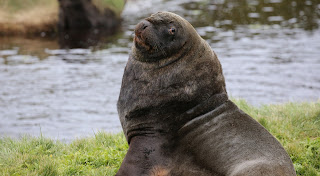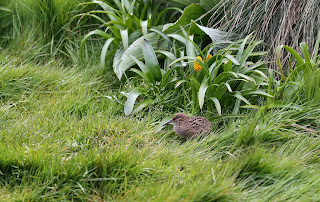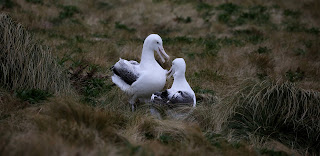Perserverance Harbour
It was so nice to not be tossed around!
The entire archipelago is volcanic with the main Campbell Island being by far the largest at 11,268 hectares. other islands including Dent are tiny in comparison.
A few endemic Campbell Island Shags were around & Southern Royal Albatrosses could be seen flying high overhead.
Mount Honey, (569 m) the highest point,
in the distance.
in the distance.
The old research centre, now sadly no longer used
& in decay.
Inquisitive to the extreme!
Types of tussock grass dominate in some areas.
The only piece of the old homestead left -
the cast iron stove!
Kelp Gull
A vagrant King Penguin tucked away in
the grass, out of the fierce wind.
Campbell Island Pipit
By far the commonest passerine on the island.
Very tame & confiding.
After breakfast we did a zodiac cruise around the
harbour, exploring little coves & sheltered bays. We saw the sight of an
old homestead (not much to see now) & found a vagrant King Penguin in one of the bays.
The best of the morning was however our views of Campbell Island Teal. We saw two
different males (the females are now sat on nests) & it was interesting to
see the differences between this species & the Auckland Island Flightless
Teal seen previously.
On the way to the loneliest tree in the world!
Here it is!
Siyka Spruce planted here in the early 1900's.
But to get to the tree one has to pass these boys!
On territory, inquisitive & fearless.
Not a good combination!
By now the weather was again deteriorating & we
headed back to the ship for lunch.
Landing at Tucker Cove
Campbell Island Shag
The entire population is only around
1,000 individuals.
1,000 individuals.
Red billed Gull now lumped again with
Silver Gull
The old research centre.
This little beauty popped out!
Campbell Island (Sub-antarctic) Snipe
This is the chick: the parents kept well hidden!
Only discovered in 1997!
The weather was very mixed in the afternoon but we
lowered the zodiacs & made a landing close to the jetty near Tucker Cove. We immediately set out on
a snipe hunt & after nearly an hour found an adult with a three-quarters grown chick. This is a tough bird to see in these conditions!
I was heading up there!
Can you see the path?
As you leave the coast, the vegetation is at first
lush, but quickly gets smaller.
These boys are surprisingly high up
in the vegetation.
Silvereye is common here.
But look at the colours!
The view behind me, when I was half way up!
The panorama is vast, hard to convey the scale
on a photograph.
Campbell Island Pipit
As you climb higher this species
gets scarcer!
Presumably it is so windy on the tops
they wouldn't be able to survive.
Still a way to go though!
As you climb higher, the mega-herbs
dominate the scenery.
Campbell Island is the Southern Royal Albatross's
main breeding ground.
This is an established pair calling to each other.
Around 8,000 pairs breed here annually.
This chick was alone on the way up!
See later!
Me, with Dent Island in the background.
Here is the chick again, then this happened!
Being fed by the adult.
Peter Harrison enjoying the moment!
Dominique, Shirley & me.
Fat & happy!
The adult flies off to the ocean.
Further down the hill there was an area for 'gaming'.
Looking for a mate
Birds call in this area hoping
to attract potential mates.
The calls are loud!
I am here!
Sometimes more than one bird arrives!
Meeting ritual.
on a photograph.
Campbell Island Pipit
As you climb higher this species
gets scarcer!
Presumably it is so windy on the tops
they wouldn't be able to survive.
Still a way to go though!
As you climb higher, the mega-herbs
dominate the scenery.
Campbell Island is the Southern Royal Albatross's
main breeding ground.
This is an established pair calling to each other.
Around 8,000 pairs breed here annually.
This chick was alone on the way up!
See later!
Me, with Dent Island in the background.
Here is the chick again, then this happened!
Being fed by the adult.
Peter Harrison enjoying the moment!
Dominique, Shirley & me.
Fat & happy!
The adult flies off to the ocean.
Further down the hill there was an area for 'gaming'.
Looking for a mate
Birds call in this area hoping
to attract potential mates.
The calls are loud!
I am here!
Sometimes more than one bird arrives!
Meeting ritual.
I then climbed the hill on the boardwalk which took
around an hour. Gradually I left the denser, taller vegetation behind, until I
was high up on the bare hills in the midst of a Southern Royal Albatross
colony. This was a wonderful surreal experience. I have never seen anything
like it! The gale force wind the landscape & the wonderful birds all made
for an amazing afternoon & the hours just flew by!
It was in bitterly cold conditions with sleet/snow
showers as I made my way down to the jetty, only to be told it was too rough to
land the zodiacs there & I had to cut across country to a more sheltered
location. It was great to get back on board in the warmth!
Best birds were:
Male Campbell Island Flightless Teal
Southern Royal Albatross
12 Mallard; 2
Campbell Island Flightless Teal; King
Penguin; 100+ Southern Royal Albatross; 7 Northern Giant Petrel; 7 Campbell Island Shag; Sub Antarctic
(Campbell) Snipe; 6 Antarctic Tern; Brown Skua & Campbell Island Pipit.
We left the sheltered harbour & we immediately plunged
into the Sub-antarctic Pacific Ocean! And plunged was the word, as we bucked
our way north into a north east gale! It was an interesting night!































































































































No comments:
Post a Comment